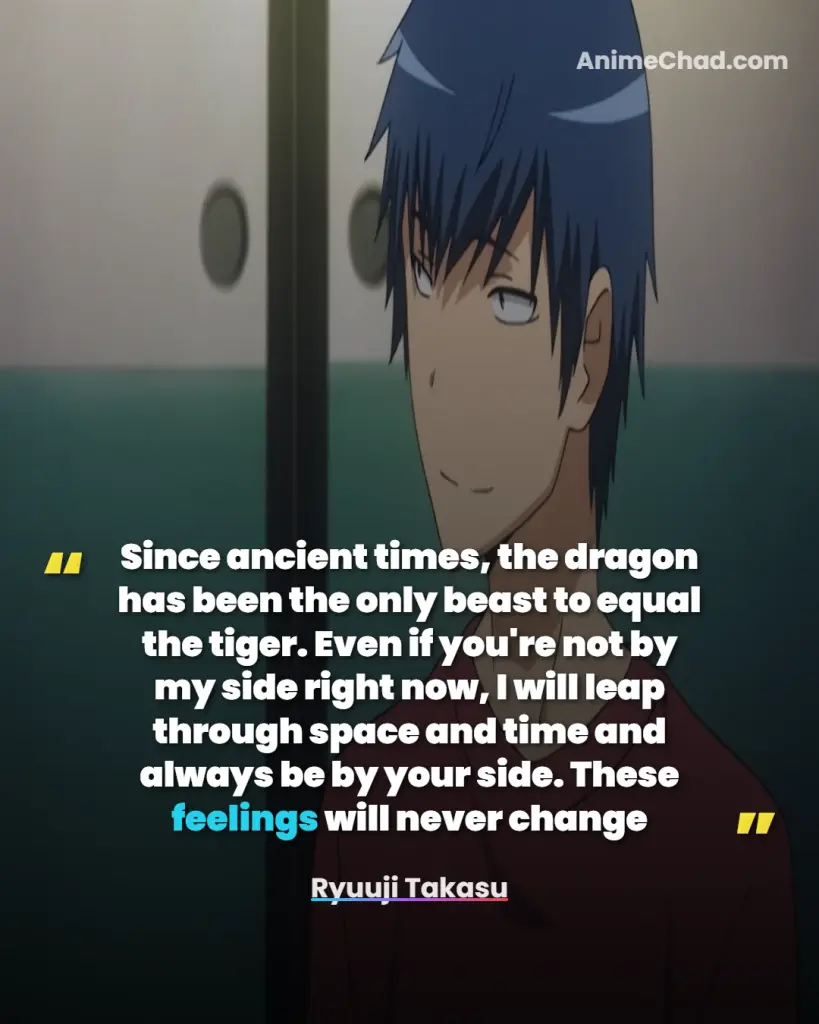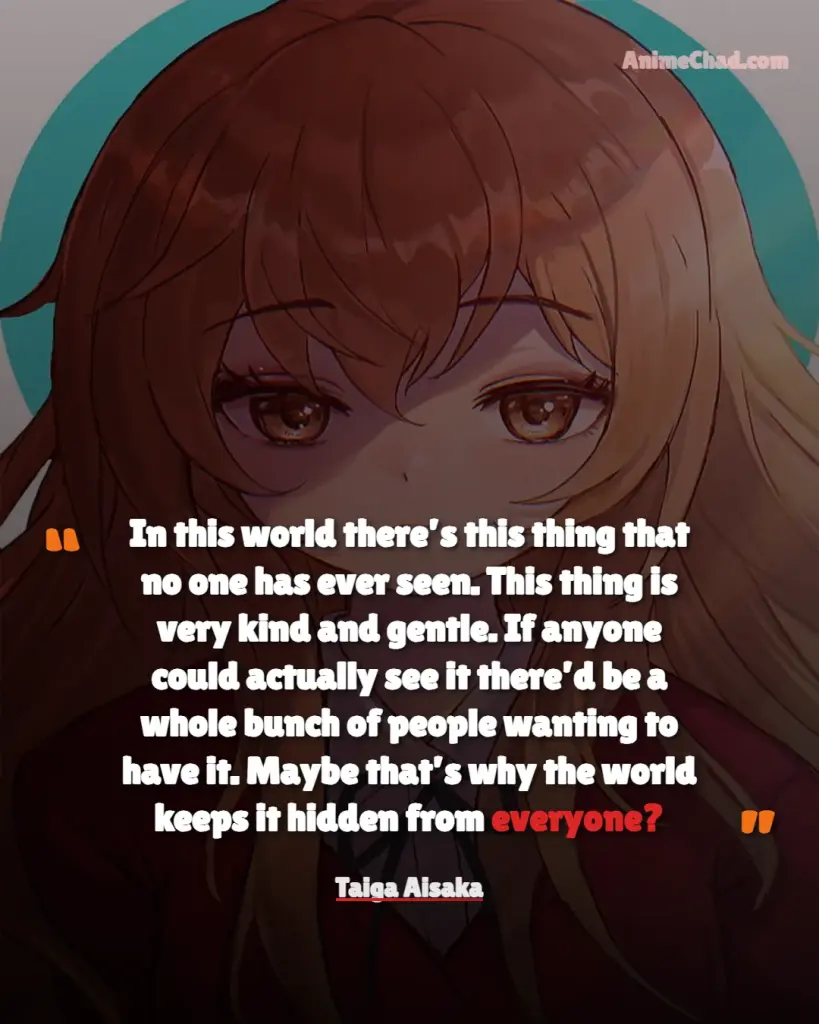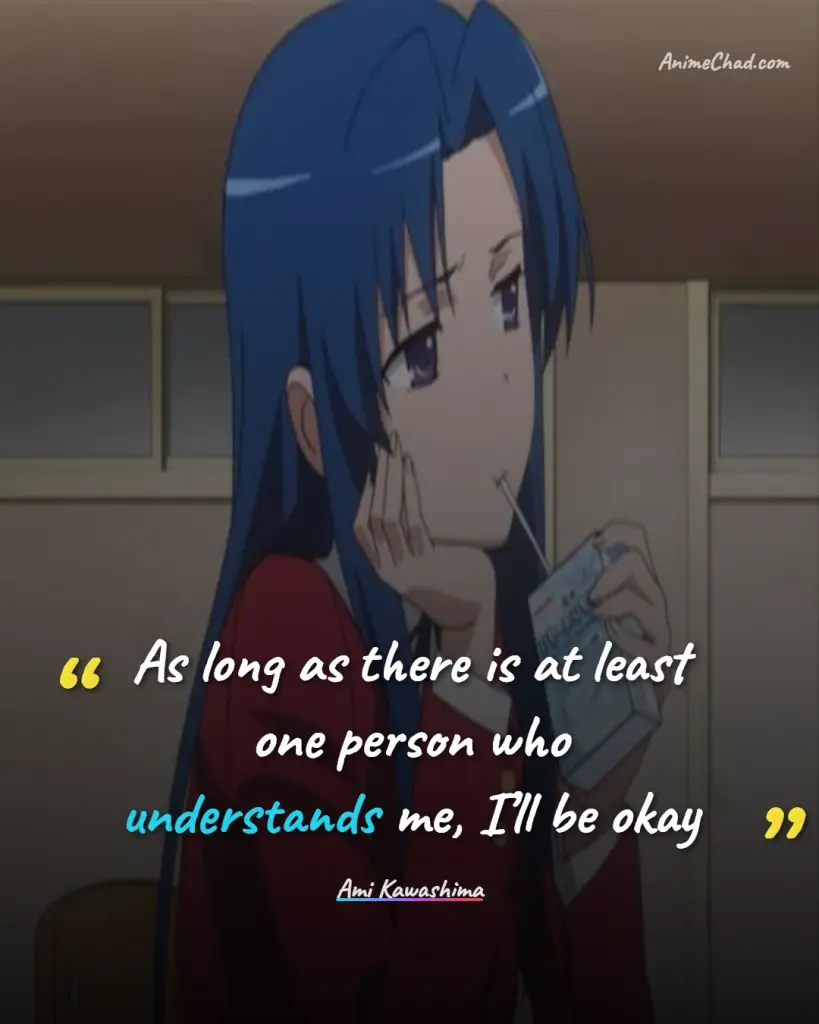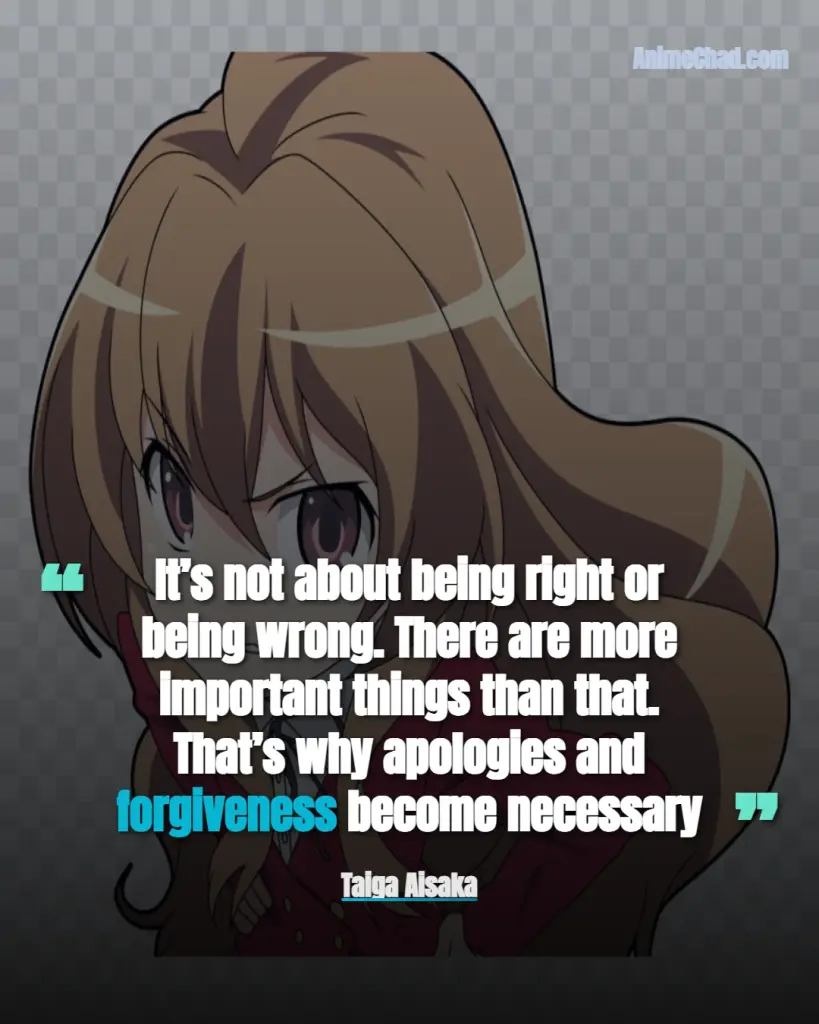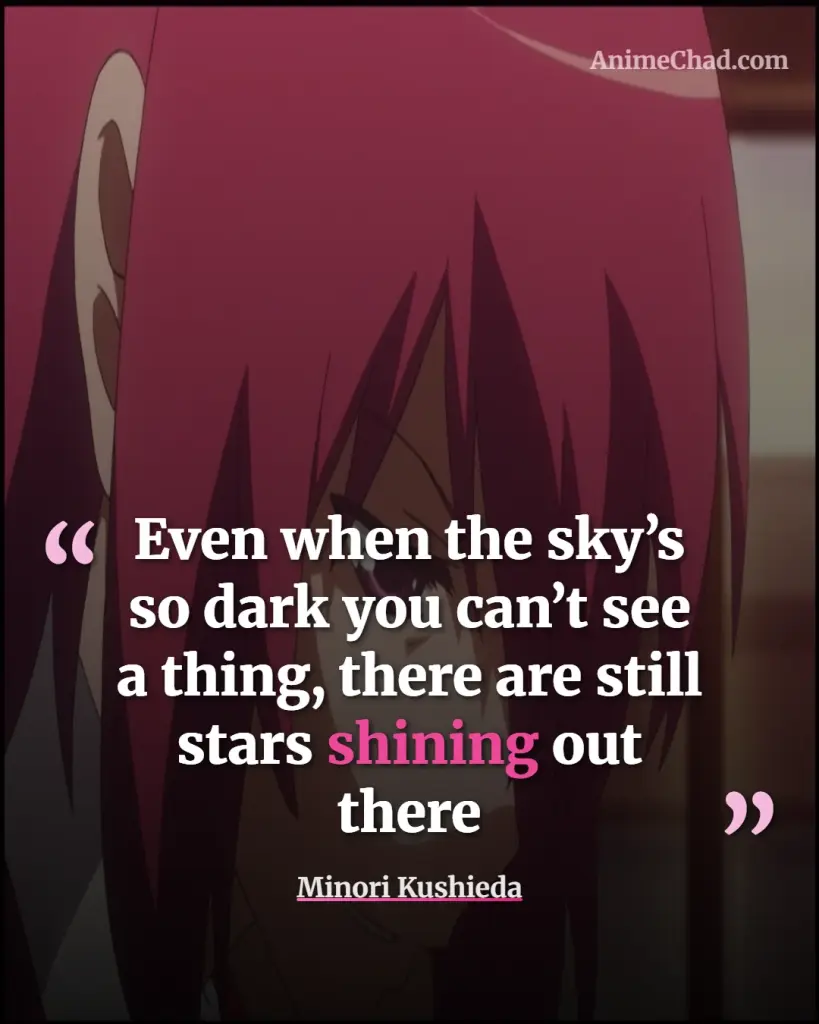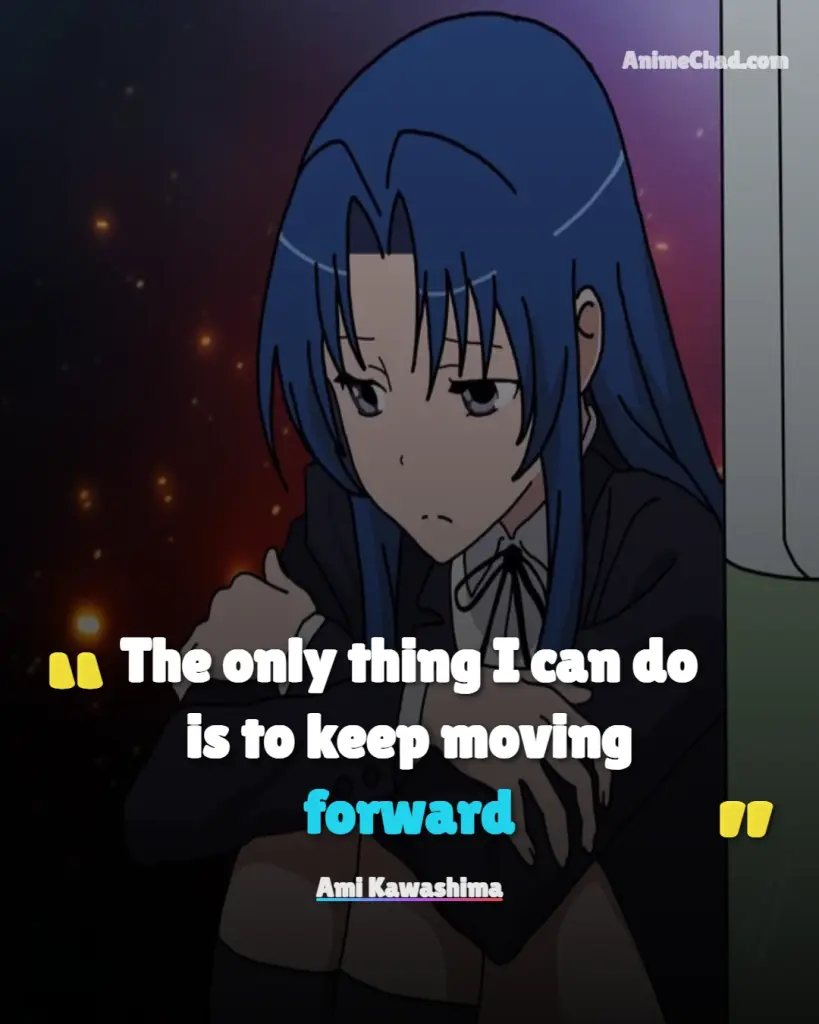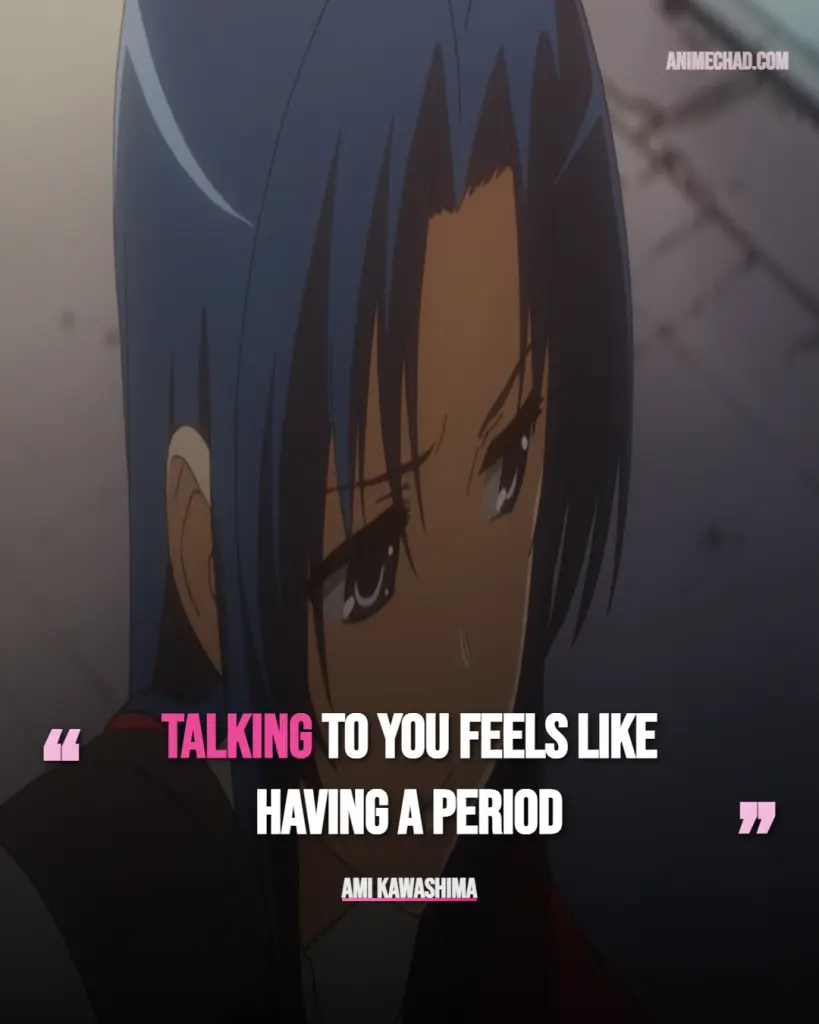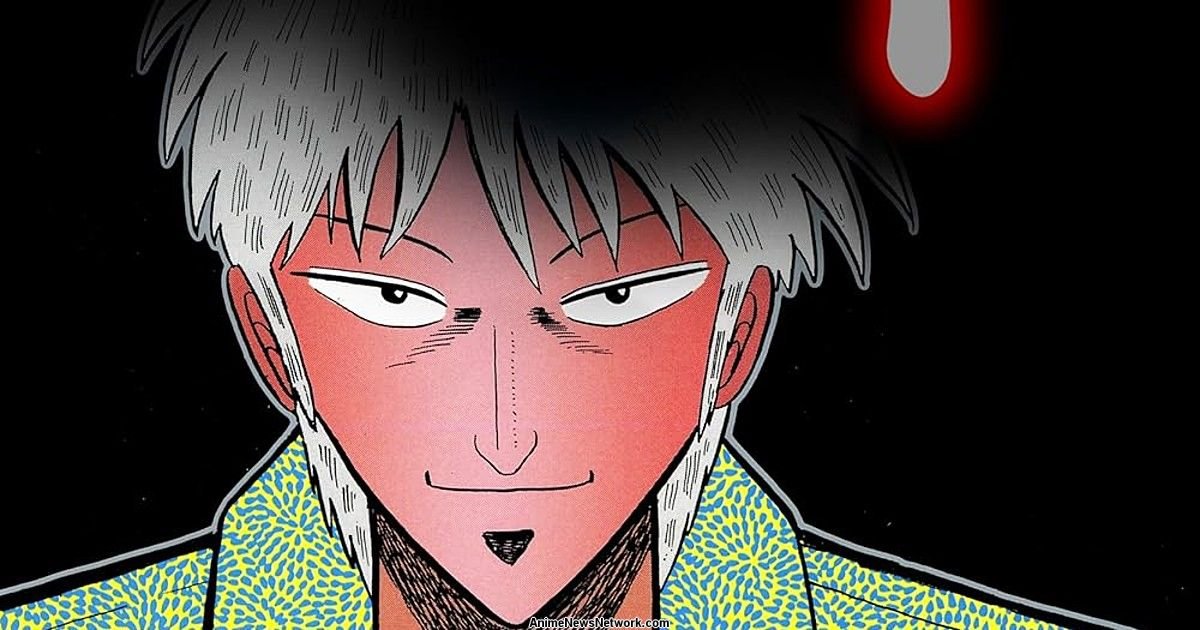Toradora! follows Taiga Aisaka, a fierce yet vulnerable high school girl known as the “Palmtop Tiger,” and Ryuuji Takasu, a diligent student misunderstood due to his intimidating appearance, as they navigate an unlikely partnership. The series delves into themes of love, self-acceptance, hidden vulnerabilities, and the courage to confront personal insecurities amid high school life.
This curated collection of 24 quotes highlights pivotal moments of emotional growth, blending intense confrontations with tender revelations to illustrate the characters’ journeys toward genuine connections.
Since ancient times, the dragon has been the only beast to equal the tiger. Even if you’re not by my side right now, I will leap through space and time and always be by your side. These feelings will never change
Episode 25 (Toradora!)
Ryuuji Takasu
Ryuuji’s heartfelt vow during Taiga’s departure underscores his unwavering commitment, marking profound character growth from reluctant ally to devoted partner and echoing the series’ theme of enduring love despite separation.
I hate waiting, but if waiting means being able to be with you, I’ll wait for as long as forever
Episode 24 (The Road We Climb)
Taiga Aisaka
Taiga’s confession reveals her softening vulnerability, transforming her tsundere facade into honest devotion, highlighting the theme of patience in love and her evolution from isolated fighter to someone embracing emotional bonds.
My happiness can only be… can only be made with my own hands! My happiness doesn’t depend on anybody but me!
Episode 18 (Your Answer)
Minori Kushieda
Minori’s defiant assertion during her emotional breakdown emphasizes self-reliance, showcasing her quirky optimism masking deeper pain and connecting to the series’ exploration of independence amid romantic entanglements.
Crying is a nosebleed of the heart. If you trip while running down a hallway, you’ll get a nosebleed. If you trip in life, you’ll cry
Episode 9 (The Tiger and the Dragon)
Minori Kushieda
This whimsical yet poignant metaphor captures Minori’s philosophy on emotional resilience, reflecting her growth in accepting life’s stumbles and tying into themes of vulnerability without despair.
Haven’t you already lifted your foot, preparing to step forward? Then you only have one option. Finish taking that step!
Episode 20 (No Matter What)
Sumire Kano
Sumire’s encouraging words to Kitamura propel his student council resolve, illustrating her mature influence on others’ development and the broader theme of bold choices in personal and relational progress.
In this world there’s this thing that no one has ever seen. This thing is very kind and gentle. If anyone could actually see it there’d be a whole bunch of people wanting to have it. Maybe that’s why the world keeps it hidden from everyone?
Episode 1 (Tiger and Dragon)
Taiga Aisaka
Taiga’s opening narration poetically introduces love as elusive and precious, setting the stage for her guarded heart’s gradual opening and the series’ core motif of discovering hidden emotional treasures.
As long as there is at least one person who understands me, I’ll be okay
Episode 19 (Days of False Smiles)
Ami Kawashima
Ami’s vulnerable admission during her identity crisis reveals her facade’s toll, marking her shift toward authenticity and reinforcing the theme of mutual understanding as a lifeline in isolation.
Adoration never leads to a balanced relationship
Episode 15 (The Stars Are Hiding)
Ami Kawashima
Ami critiques one-sided affection in confronting her feelings, highlighting her analytical growth from superficial model to insightful friend, and underscoring the series’ emphasis on equitable emotional dynamics.
I don’t want to be alone anymore
Episode 22 (Becoming a Tiger)
Ryuuji Takasu
Ryuuji’s raw plea amid relationship turmoil exposes his fear of solitude, driving his commitment to Taiga and embodying the theme of found family healing deep-seated loneliness.
It’s not about being right or being wrong. There are more important things than that. That’s why apologies and forgiveness become necessary
Episode 16 (Fries and a Friend)
Taiga Aisaka
Taiga’s reflective words after a heated argument promote reconciliation, signifying her maturation beyond prideful outbursts and linking to themes of forgiveness fostering deeper connections.
Even when the sky’s so dark you can’t see a thing, there are still stars shining out there
Episode 13 (The Shape of Happiness to Come)
Minori Kushieda
Minori’s hopeful analogy comforts amid festival uncertainties, reflecting her optimistic core that aids others’ growth and ties into the series’ motif of hope persisting through personal darkness.
Stop living in the past like an old man
Episode 10 (The Voice of the Fawn Seeps Through)
Taiga Aisaka
Taiga’s sharp nudge to Ryuuji urges forward momentum, showcasing her evolving role as motivator and highlighting themes of overcoming regrets to embrace present relationships.
The only thing I can do is to keep moving forward
Episode 19 (Days of False Smiles)
Ami Kawashima
Ami’s determined resolve amid self-doubt propels her character arc toward genuine self-expression, connecting to the narrative’s focus on perseverance in navigating identity and love.
I don’t want to be a burden to anyone
Episode 21 (The Summer Festival of Our Youth)
Taiga Aisaka
Taiga’s insecure confession at the festival reveals her fear of dependency, marking key development in her acceptance of support and the theme of vulnerability strengthening bonds.
It’s those ‘no big deal’ things that matter the most
Episode 12 (The True Meaning of Family)
Minori Kushieda
Minori’s insight during a casual gathering values everyday joys, illustrating her growth in appreciating subtle happiness and aligning with the series’ celebration of ordinary relational warmth.
I’d never really questioned whether I was lonely or not
Episode 7 (Taiga and Minori)
Minori Kushieda
Minori’s introspective admission uncovers her hidden isolation, fostering deeper friendships and echoing themes of self-awareness leading to emotional fulfillment.
How can I know what I want to do later when I don’t even know what I want to do right now?
Episode 14 (The Time for Flowers to Bloom)
Taiga Aisaka
Taiga’s frustrated query amid career talks exposes her uncertainty, driving her reliance on Ryuuji and highlighting themes of youthful confusion evolving into purposeful love.
The thing you wished for the most, is something you’ll never get
Episode 23 (Let’s Go to the Final Festival)
Taiga Aisaka
Taiga’s melancholic realization before the cultural festival confronts unattainable desires, signifying her growth in prioritizing attainable happiness and the pain of choice.
Having someone saying you’re okay and being needed by that person, it was nice to have someone like that
Episode 11 (The Tiger’s Confession)
Taiga Aisaka
Taiga’s tender admission post-confession affirms the comfort of mutual need, advancing her from combative loner to interdependent partner in the series’ relational themes.
Don’t worry. You won’t be completely alone. You’ve got me
Episode 20 (No Matter What)
Kitamura Yusaku
Kitamura’s reassuring promise to a struggling peer reflects his leadership growth, tying into motifs of solidarity amid personal crossroads and quiet support.
It doesn’t matter if you grew up without parents, and it doesn’t matter if you don’t believe in God. There’s someone out there watching over you
Episode 8 (The Proper Way to Express a Crush)
Taiga Aisaka
Taiga’s comforting words to an insecure friend challenge her own abandonment issues, showing empathy’s role in her development and the theme of unseen guardianship in love.
I’ll make it so you can stand in front of Kitamura… with your chest puffed out
Episode 6 (The Palmtop Tiger’s Claws)
Ryuuji Takasu
Ryuuji’s supportive vow during Taiga’s makeover boosts her confidence, marking his shift to protector and underscoring themes of partnership empowering individual growth.
Talking to you feels like having a period
Episode 4 (I am the Idiot)
Ami Kawashima
Ami’s sarcastic quip at Ryuuji exposes her blunt humor masking attraction, initiating her arc toward dropping pretenses and engaging authentically with the group.
The shaky first step I took after receiving the president’s encouragement… wasn’t for nothing. But after all that. Now… I’m too scared to take the next step
Episode 17 (And Then, There Were None)
Kitamura Yusaku
Kitamura’s vulnerable reflection on his regrets reveals cracks in his perfect image, fostering empathy from others and connecting to themes of fear hindering progress.


